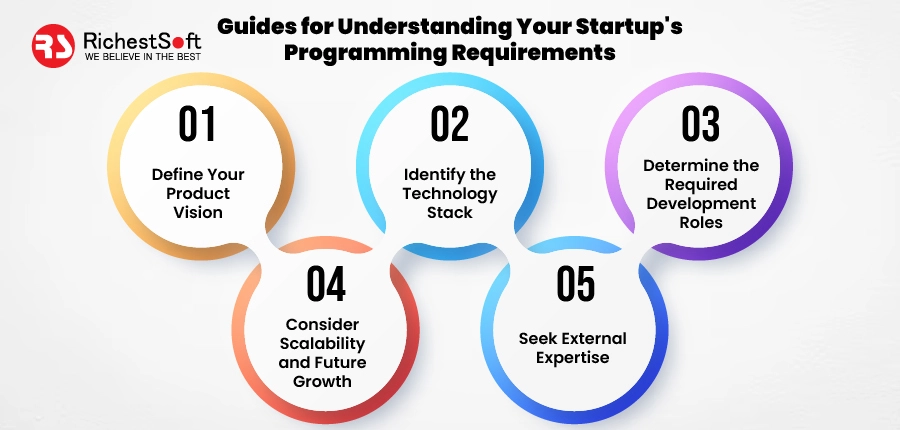Beginning a new business venture can be exciting but challenging, particularly when discovering the right talent to transform your vision into existence. In today’s competitive world, startups must assure experienced programmers develop innovative software solutions that set them apart. While hiring programmers may seem complicated, even for those new to the startup and tech scene, it’s necessary to guarantee your business’s success.
It is crucial to acknowledge the latest discoveries made by Stack Overflow, revealing the abundance of competent developers ready for recruitment, as 87.5% of them are willing to explore new employment opportunities. Moreover, LinkedIn’s report emphasizes the soaring need for software engineering positions in various sectors.
This blog post will provide a comprehensive guide for beginners on hiring programmers for startups. In this discussion, we will emphasize the significance of hiring suitable programmers. We will also provide valuable insights on prime factors to consider during recruitment and tips to help you make knowledgeable decisions. Whether you’re a non-technical founder or someone with limited experience in hiring programmers, this guide will give you the proficiency and confidence to make a stellar development team.
Understanding Your Startup’s Programming Needs
In today’s world, programming knowledge is crucial for startup success. It’s the foundation for creating innovative products, streamlining operations, and gaining a competitive edge. However, for beginners, comprehending the intricacies of programming needs can take time and effort. Here are some salient guides to help you clearly understand your startup’s programming requirements.
1. Define Your Product Vision
Before diving into the programming needs, defining your product vision is crucial. Start by understanding the problem your product aims to solve and identifying the core functionalities it should offer. Consider factors such as target audience, user experience, and potential scalability. This clarity will serve as a solid foundation for determining your programming needs.
2. Identify the Technology Stack
Once you have a clear product vision, it’s time to identify the technology stack required to bring your product to life. The technology stack comprises the programming languages, frameworks, and tools used in development. If you need more clarification about the best technology stack for your startup, consulting with experienced developers or technology experts can be beneficial. Consider factors like the flexibility of the chosen technologies, community support, and the availability of skilled developers.
3. Determine the Required Development Roles
Understanding the different development roles and their responsibilities is crucial for building an effective programming team. Here are some major roles to consider:
✅Front-End Developer: These developers possess expertise in creating a visually appealing and user-friendly interface while ensuring a seamless and hassle-free user experience. Their expertise lies in handling programming languages like HTML, CSS, and JavaScript with exceptional proficiency.
✅Back-End Developer: Back-end developers primarily concentrate on server-side programming and database management. They use languages like Python, Ruby, or Java to handle data storage and implement server-side functionality.
✅Full-Stack Developer: Full-stack developers possess front-end and back-end development expertise, making them exceptionally versatile and valuable assets in software engineering. They can handle the entire development process, from user interface design to server-side logic.
✅DevOps Engineer: DevOps engineers are highly skilled professionals whose chief objective is to optimize development and deployment processes through automation and streamlining. They ensure smooth collaboration between development and operations teams.
4. Consider Scalability and Future Growth
As a startup, it’s essential to consider scalability and future growth when defining your programming needs. Your product should be designed to handle increasing user demands and adapt to changing market trends. Choosing scalable technologies and building a flexible architecture will help your startup grow without significant technical constraints. Consider factors like cloud infrastructure, data storage scalability, and the ability to integrate with third-party services.
5. Seek External Expertise
If you have limited technical expertise, seeking external assistance can be valuable. Hiring experienced developers or working with a reputable software development agency can provide guidance and expertise to meet your programming needs. These professionals can help you make informed decisions, avoid common pitfalls, and accelerate your startup’s development.
Creating Job Descriptions and Ideal Profiles
The success of your startup hinges on assembling a skilled and dedicated development team. However, creating compelling job descriptions and defining ideal profiles for programmers can be daunting, especially for beginners. Here provide a professional and beginner-friendly guide to help you create job descriptions and identify the perfect profiles when hiring programmers for your startup.
Step 1: Understand Your Startup’s Programming Needs
Before diving into the job description creation process, take the time to understand your startup’s programming needs. Ensure success in your project by carefully considering technical requirements, programming languages, and frameworks and identifying the significant roles and responsibilities to be fulfilled. This understanding will provide a solid foundation for crafting targeted job descriptions.
Step 2: Structure Your Job Descriptions
Well-structured job descriptions are crucial for attracting qualified candidates and communicating your expectations. Start with a concise and accurate job title that reflects the role you’re looking to fill. Provide an overview of the position, outlining the primary responsibilities and objectives. Specify the required technical skills, programming languages, and any relevant experience or certifications. Also, highlight desirable soft skills such as problem-solving, teamwork, and communication.
Step 3: Focus on Essential Technical Skills
When hiring programmers, it is necessary to focus on the required technical skills for the specific role. Clearly articulate the programming languages, frameworks, and tools candidates should use. To ensure a successful web application, one must prioritize including predominant languages such as JavaScript, HTML, and CSS in their development list. You can also include frameworks like React or Angular. This specificity will attract candidates with the right technical expertise for your startup’s needs.
Step 4: Highlight Desired Soft Skills
To succeed as a programmer, you need technical and soft skills like critical thinking, problem-solving, adaptability, and communication. Startups want programmers who collaborate, think critically, and adapt to changes. By highlighting these desired soft skills, you’ll attract candidates who excel technically and align with your startup’s culture and values.
Step 5: Define Ideal Profiles
Defining the ideal profiles for your programmers goes beyond technical skills and qualifications. Consider the characteristics and qualities that align with your startup’s values and work environment. Reflect on traits such as a passion for technology, creativity, and the ability to thrive in a fast-paced and dynamic startup setting. Articulating the ideal profiles will help to attract candidates with the necessary skills and embody your startup’s culture and vision.
Step 6: Review and Refine
Creating job descriptions and ideal profiles is an iterative process. Regularly review and refine your job descriptions based on feedback and experiences gained during the hiring process. Seek input from your team, industry professionals, or mentors to gain different perspectives. Make adjustments as necessary to ensure your job descriptions accurately reflect your evolving startup needs and the dynamics of the programming market.
Where to Find the Best Programmers for Startups?
Finding skilled programmers for your startup is crucial to building a successful venture. Here we will provide a professional and beginner-friendly guide to help you discover the best avenues for finding the best programmers for your startup, including partnering with a software outsourcing company.
1. Online Job Platforms
Online job platforms are a popular and accessible way to find talented programmers. Websites such as LinkedIn, Indeed, and Stack Overflow have sections specifically for job postings. These sections allow you to sort candidates based on their skills and experience levels. Craft clear and compelling job descriptions that highlight your startup’s unique opportunities and attract the attention of skilled programmers. These platforms provide a broad reach and enable you to connect with candidates who align with your startup’s goals.
2. Developer Communities
Developer communities are vibrant hubs of talent and collaboration. Platforms like GitHub, GitLab, and Stack Exchange host active developer communities where programmers share knowledge and engage in discussions. Participate in these communities by reviewing the work of talented individuals, initiating conversations, and exploring potential collaborations. Connecting with programmers in these communities allows you to build relationships and identify those with the skills and passion your startup requires.
3. Tech Conferences and Meetups
Attending tech conferences and meetups is an excellent method to network and connect with fellow programmers in person. Look for industry-specific conferences and local meetups where programmers gather to learn, share insights, and connect with peers. Engage in conversations, share your startup’s vision, and collect contact information from interested programmers. These events provide opportunities to communicate with programmers actively involved in the industry and eager to contribute to exciting projects.
4. Coding Bootcamps and Universities
Coding boot camps and universities are valuable sources of talent, especially for startups looking to work with fresh and motivated programmers. Contact coding boot camps in your area and inquire about their graduates or alumni networks. Additionally, establish connections with universities offering computer science or software engineering programs. Participate in career fairs and consider offering internships to attract promising programmers eager to gain practical experience. Collaborating with coding boot camps and universities can help you tap into a pool of emerging talent and support your startup’s growth.
5. Freelancing Platforms
Freelancing platforms such as Upwork and Freelancer provide access to a diverse pool of experienced freelance programmers. These platforms authorize you to browse profiles, review previous work, and engage freelancers based on their expertise and track record. Communicate your project needs, timeline, and budget to draw high-quality freelancers who can contribute to your startup’s success. Freelancing platforms are perfect for short-term projects or if you require additional support for your existing team.
6. Software Outsourcing Companies
Partnering with a software outsourcing company can be a viable option for startups seeking access to a dedicated team of skilled programmers. Software outsourcing companies specialize in providing programming expertise and can offer you a pool of highly qualified professionals who can work on your startup’s projects remotely. Collaborating with an outsourcing company allows you to leverage their experience and resources while focusing on other aspects of your startup’s growth.
How to Screen and Interview Potential Programmers?
Screening and interviewing potential programmers is critical in building a talented and high-performing team for your startup. Here we will provide a professional and beginner-friendly guide to help you effectively screen and interview potential programmers for your startup.
1. Review Resumes and Portfolios
Start by carefully reviewing resumes and portfolios to get an initial understanding of candidates’ qualifications and experiences. Look for relevant programming languages, frameworks, and technologies they have worked with. Pay attention to projects they have completed and assess the complexity and quality of their work. When evaluating, watch for signs of problem-solving abilities, creativity, and a keen eye for detail.
2. Conduct Phone or Video Screenings
Phone or video screenings effectively assess candidates’ communication skills and gather more information about their technical abilities. Prepare a set of structured questions tailored to your startup’s specific needs. Ask candidates about their previous projects, challenges, and how they resolved them. Additionally, evaluate their problem-solving approach and ability to explain technical concepts clearly and concisely.
3. Technical Assessments
Technical assessments are crucial for evaluating candidates’ programming skills. There are various processes you can take:
(a) Coding Exercises: Provide candidates with coding exercises relevant to your startup’s technologies and challenges. Ask them to solve problems or complete tasks within a given timeframe. Assess their ability to write clean, efficient, and maintainable code.
(b) Take-Home Assignments: Assign candidates a real-world problem or a project that simulates the work they would do at your startup. Communicate the expectations, guidelines, and deadlines. Assess their ability to apply their skills and deliver a functional and well-structured solution.
(c) Pair Programming: Conduct a pair programming session where candidates collaborate with you or a team member on a coding problem. Evaluate their ability to work effectively in a team, communicate ideas, and solve problems collaboratively.
4. Cultural Fit and Soft Skills
Assessing cultural fit and soft skills is as important as evaluating technical abilities. Evaluate the following:
(a) Teamwork and Collaboration: Consider candidates’ capability to work well in a team atmosphere. Inquire about their collaboration experience, conflict resolution skills, and contributions to team positivity.
(b) Problem-solving and Adaptability: Assess prospective candidates’ problem-solving skills and flexibility when encountering novel obstacles. Ask about instances where they faced difficulties and how they overcame them.
(c) Communication and Clarity: Evaluate candidates’ verbal and written communication skills. Assess their ability to articulate complex ideas, explain technical concepts to non-technical team members, and document their work effectively.
5. Face-to-Face Interviews
When conducting in-person interviews, assessing the candidate’s personality, professionalism, and motivation is crucial. Asking behavioral and situational questions can reveal their reactions in various scenarios. Ask about their long-term career goals, interest in your startup, and how they stay current with industry trends.
Testing a Programmer’s Skills and Abilities
Testing a programmer’s skills and abilities is crucial in startup hiring. Assessing a candidate’s technical proficiency ensures that you hire individuals who can contribute effectively to your team and help drive your startup’s success. Here, we will provide a professional and beginner-friendly guide to help you effectively test a programmer’s skills and abilities during hiring.
1. Technical Assessments
Evaluating a programmer’s skills requires conducting technical assessments. The following are some methods you can use:
(a) Coding Exercises: To assess problem-solving and coding skills, offer candidates coding exercises. Tailor the activities to your startup’s technology stack and your team’s specific challenges. Evaluate their approach, code readability, efficiency, and adherence to best practices.
(b) Algorithmic Problem-Solving: Assess a candidate’s ability to solve algorithmic problems efficiently. Present them with coding challenges that require logical thinking and algorithmic optimization. Evaluate their problem-solving strategies and the quality of their solutions.
(c) System Design: Assess a candidate’s ability to design scalable and efficient systems. Present them with real-world scenarios or architectural problems and ask them to propose a high-level system design. Evaluate their understanding of system components, scalability considerations, and trade-offs.
2. Real-World Projects
Assigning candidates real-world projects can provide insights into their abilities to work on practical tasks. Develop a project that simulates the work they would encounter at your startup. Set clear expectations, provide necessary documentation or resources, and define a timeline for completion. Evaluate their ability to analyze requirements, architect solutions, and deliver a functional and well-structured project.
3. Pair Programming
Conducting pair programming sessions is an effective way to assess a candidate’s coding skills and collaboration abilities. Engage the candidate in a coding session where they work with you or a team member on a specific problem or task. Observe their coding style, problem-solving approach, and how well they communicate and collaborate during the session.
4. Code Reviews
Reviewing a candidate’s existing code or code samples can provide insights into their coding practices, maintainability, and adherence to best practices. Ask candidates to share code samples or projects they have previously worked on. Evaluate their code structure, readability, use of appropriate coding patterns, and error-handling practices.
5. Communication and Problem-Solving Scenarios
Assess a candidate’s communication and problem-solving abilities through hypothetical scenarios or discussions. Present them with challenging situations they may encounter in their role and ask how they would approach and solve them. Evaluate their ability to think critically, communicate their ideas clearly, and collaborate with team members.
6. Continuous Learning and Growth
Assess a candidate’s commitment to continuous learning and growth within the programming field. Ask about their experiences learning new technologies or programming languages, participation in open-source projects, or engagement with the developer community. Hire candidates who show dedication to self-improvement and keeping up with industry advancements.
Onboarding and Retaining Programmers
Onboarding and retaining programmers is a crucial aspect of building a successful startup. Integrating new programmers into your team and ensuring their long-term engagement is essential for productivity and the overall growth of your company. Here we will provide a professional and beginner-friendly guide to help you effectively onboard and retain programmers in your startup.
1. Structured Onboarding Process
Establishing a structured onboarding process ensures a smooth transition for new programmers. Consider the following steps:
(a) Preparing Ahead: Before the new programmer starts, ensure their workspace, equipment, and necessary tools are ready. Set up their accounts, access permissions, and provide relevant documentation or resources.
(b) Introduction to the Team: Introduce the new programmer to the existing team members. Arrange a team meeting or a virtual introduction session to facilitate connections and create a welcoming atmosphere. Encourage team members to share their roles and responsibilities and support the new member.
(c) Company Overview: Provide an overview of your startup’s mission, vision, and values. Help new programmers understand the larger context and their role in achieving the company’s goals. Share information about the startup’s history, culture, and any unique aspects that differentiate it from others.
(d) Project Familiarization: Familiarize new programmers with the ongoing projects, the technologies used, and the existing codebase. Assign a mentor or a buddy to guide them through the initial learning process and provide support as they navigate the project requirements.
(e) Training and Skill Development: Identify skill gaps and offer training or resources to help new programmers enhance their skills. Provide access to learning platforms, online courses, or workshops to support their professional growth.
2. Clear Expectations and Goals
Setting clear expectations and goals is essential for programmer retention. Ensure that new programmers understand their roles, responsibilities, and performance expectations. Establish regular feedback and evaluation processes to provide guidance and assess their progress. Communicate the startup’s growth plans and career advancement opportunities, demonstrating a clear path for development within the company.
3. Supportive Work Environment
Creating a supportive work environment is crucial for programmer retention. Foster a culture of open communication, collaboration, and continuous learning. Encourage programmers to share ideas, provide feedback, and contribute to decision-making. Offer opportunities for skill expansion, such as attending conferences, participating in workshops, or engaging in professional development programs.
4. Recognition and Rewards
Recognizing and rewarding the efforts of your programmers can significantly enhance their job satisfaction and motivation. Celebrate achievements, milestones, and successful project deliveries. Implement a rewards system that acknowledges exceptional performance, such as bonuses, promotions, or public recognition within the team or the company.
5. Work-Life Balance
Promote a healthy work-life balance to prevent burnout and ensure long-term engagement. Encourage programmers to take breaks, establish flexible working hours, and provide support for personal commitments. Offer remote work options or flexible schedules to accommodate individual needs.
6. Regular Check-Ins and Feedback
Maintain regular check-ins and provide constructive feedback to programmers. Schedule one-on-one meetings to address concerns, provide guidance, and offer growth opportunities. Actively listen to their ideas, challenges, and suggestions, fostering a culture of open dialogue and continuous improvement.
Conclusion
Hiring programmers for startups is crucial in building a talented and high-performing team. By creating clear job descriptions, attracting candidates with the right skills and qualifications, and conducting thorough screening and interviews, you can find the best fit for your startup’s programming needs.
Cultural fit and soft skills are just as foremost as technical expertise. Utilize various channels and platforms to expand your candidate pool and consider partnering with software outsourcing companies. Investing ample time and dedication into the hiring process will undoubtedly lead to a resilient team that drives your startup toward triumph.







Leave a Reply